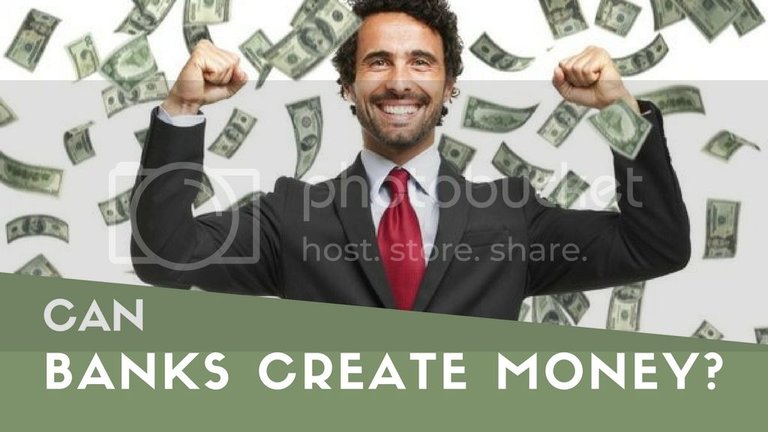
You may have heard that banks create money out of thin air every time they make a loan and that 97% of all money was created in this way. If so, parts of what you've heard are true and parts of it aren't.
In this article, I'm only going to answer the question about whether or not banks can create money. Rather than giving full explanations in a single post, I'll break it up into multiple posts over time, so you can take that glazed look off your face!
Lending
There's an enormous amount of false information online about how this works. If you've heard anyone talking about something called fractional reserve banking or the money multiplier, but this method of money creation is a myth. What banks actually use is something called credit creation.
Accountants will immediately understand how this works (and most economists don't because they haven't learned accounting). If you want to borrow money to buy yourself a trendy new gadget, like a smartphone that mines cryptocurrency every time you make a call, the bank makes the following three entries on their ledger:
- Debit the personal loan account
- Credit the personal loan interest account
- Credit the borrower's account
And that's one way they create a lot of money. They enter assets on one side of the balance sheet and liabilities on the other side. Accounting 101.

Spending
If a bank buys goods or services from someone who has an account at the bank, then they can create money to buy those goods and services. All they need to do is enter some numbers into a computer to increase the balance of the vendors account.
As governments make most of their important decisions by playing rock, paper, scissors, it's important that they don't make any mistakes. When they spend money on purchasing the instruction manuals for the game, the central bank will create money in the account of a commercial bank, who then increases the balance of the printing company's account. The same thing happens when they buy other stuff, too.
The claims that 97% of the money supply was created through lending are incorrect because they haven't factored in this method of creating money.
Is It The Same As Government-Created Money?
Central banks create money in a similar way to commercial banks. They simply enter numbers into a computer. However, the government will only accept money that has been created by the central bank for the payment of taxes.
"What about coins? In Australia, they're created by the Royal Mint and not the central bank."
True, but if you call the Australian tax office, they'll tell you that they never accept notes or coins for the payment of taxes - only electronic transfers. If you go to their office and try to hand over cash, they might just direct you to the nearest post office so that you can give the cash to them and they'll make the electronic transfer for you.
The government doesn't accept bank-created money for taxes. It's just a liability on the banks balance sheet, so it makes no sense for them to take it.

Is the money that banks create really money? Well, it's bank credit. They try to make it look the same as government-created money by giving it the same name (dollars, pounds, yen, etc.) and will exchange their credit one-for-one with government-created money. It's just marketing, but that doesn't mean that it isn't money. I'd argue that anything that gets used as money is money.
There's More
I'm not going to go into things like capital adequacy requirements here because they're pretty boring, even when I talk about them. I'll probably give them their own post because they explain why banks can't just create infinite amounts of money and buy themselves out of trouble.
Banks create vast amounts of money for people who want to buy real estate, but they don't lend so much to businesses. This means that the price of real estate can increase rapidly while incomes stagnate, thus creating an economic bubble. That's definitely getting several posts (inflation, unaffordable housing, intergenerational fairness, inequality growth, etc.) of its own.
Should banks be allowed to create money? Well, money has to get into the economy one way or another and banks are supposed to do this. They don't do a great job at it, though. That'll be another post, someday.
Conclusion
At the end of the day, banks are a bit like a version of Santa Claus who lends out toys for up to 35 years. So, if you hate banks, you hate children!
The way I explain it is this. Money does not really exist. And banks are selling people numbers. Just like when you make a transfer from one account to another. But, the difference is you the user just distribute their "fake" creation while they create it when they need it and however much they want. Money today is nothing but the creation of numbers and a way to enslave people.
Great post my friend as always. Thank you for sharing. Have a great day. :)
This is true. Hopefully, humankind will outgrow the need or desire for money. I want something like Star Trek, but with higher production values.
I think money is the current way people transact on values. So while I agree that money is a creation and not a true representation of value it self, money doesn't enslave people in the same way that guns don't kill people, people do (at least until human created robots decide to exterminate us).
Hehe, very well said.
It will take some time to undo something which was implemented as a thing of "value" for thousands of years. But, lately, with crypto, we are making long strides to even out the playing field for everybody living on this planet. :)
Let's just sit back, do our part, and see what happens in the future. I am optimistic about it. :)
My philosophy over the past half a century has been to not get preoccupied studying the trees, for the sake of rather seeing the forest. I even refused to study philosophy for the sake of obtaining as objective a perspective as possible. This approach denied me stardom in any particular field in exchange for some insight about how the whole caboodle fits together, without too much of a bias in any direction.
I say this not for painting a feather in my own cap - the contrary in fact - but for placing in perspective my appreciation for guys like you who, in spite of being specialists, are capable of elevating yourselves above the indoctrination inherent in the training and objectively criticize, at the risk of losing standing in your field.
And from this same perspective, my opinion about the current bundle of knots we have tied ourselves into, if I may dare: scrap the crap and start afresh.
I'm not actually an economist. I began my career as a software engineer with a bank, but I hadn't a clue that there were any questions that I should be asking about money creation back then. I quickly switched my career to become an optical telecoms engineer and then a recruiter. Nowadays, I could probably say that I'm a specialist in employment, as I work in recruitment, have blogged about and worked in the field of human trafficking and severe labour exploitation and point out how the money system creates unemployment and how it can end unemployment within a matter of days.
Fooled me! Anyway, it makes your objectivity easier to understand, with due respect to true professionals, who are not all brainwashed, but seldom dare to speak out from their captive positions.
Good information, I have been preaching this for years. Nice to see you doing so as well.
How did you come to learn about it in the first place?
My wife's uncle was the president of the local bank, when he retired several years ago he and I would visit a bunch and over a period of three years he showed me how it all works. After he gave me the foundation of my education on money I then started doing more research as the internet came about. The biggest problem for the normal person is that they are never taught about "money" or what we call money in school. Everything people learn about money and how it works for the most part is from watching from a young age on how financial transactions take place in the homes with their parents. The Rockefeller family set up an education foundation years ago that ended up leading to the department of education, they made sure that the true workings of the central bank and banks in general would not be disclosed and they put a lot of money and energy into it for good reason. Ignorant people are easy to take advantage of and bankers and government know this very well.
So that's my story, how about you? How did you get started on this area of inquiry?
I was living in Japan in 2011 when we had the earthquake/tsunami/nuclear disasters and took 6 months off work to dedicate myself to the relief and recovery efforts. When people were coming up with ideas on how to revitalise the economy in the affected region, they just wanted to recreate the same old recessionary model that they had before. I thought they needed something more sustainable, so I began reading about sustainability.
I came across a series of videos by Chris Martinson which talked about economy, energy and environment and how they're all interlinked. In the economy section he talked about money creation, but it turned out later that everything he said was incorrect. I read about the Austrian School of economics and, while they get a lot right, their explanation of the money system was based on the old fixed exchange rate model and didn't explain the modern system correctly. As I looked around for more information, I found the videos made by Positive Money and they gave a much better explanation of how banks create money.
On message boards, people said that I should look into MMT, which I did. They give an amazing explanation of how the money system works on the government side, which is extremely important for understanding the root causes of so many of the problems we have today.
I became the head of Fair Money Australia and made it my business to talk to people who work for banks, central banks (not just in Australia) and various government departments and offices. It's obvious to me that no one has ever asked them how things work because the answers are right there. If you ask, they will tell you. And it's obvious that they only know their part of the big picture and make mistakes about the other parts, which leads to problems. Big problems!
A good and accurate education about money is lacking for most people in the USA, I love when I cash a check at the bank and the teller will ask,"how would like that back?" I tell the in U S dollars. Then when they give me Federal Reserve notes I say "it seems you have made a mistake, I asked for U S dollars." They have no clue, so I explain that if they are going to work in a financial establishment like a bank it would serve them well to learn the difference between dollars and notes.
It's like finding the Queen in Three Card Monte, lol
What an awesome post. I really learnt alot here @penston
Congratulations! This post has been chosen as one of the daily Whistle Stops for The STEEM Engine!
You can see your post's place along the track here: The Daily Whistle Stops, Issue #19 (1/17/18)
The STEEM Engine is an initiative dedicated to promoting meaningful engagement across Steemit. Find out more about us and join us today!